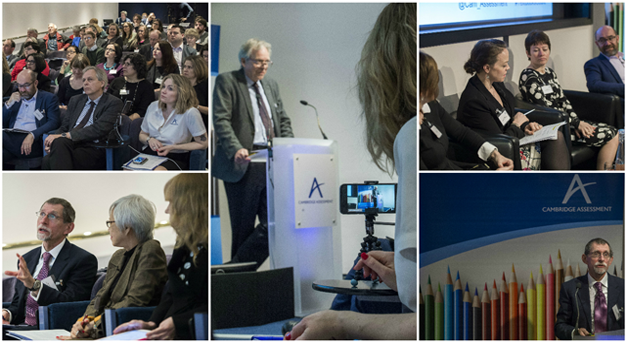29 April 2016

Publishers have been praised for the "remarkable speed" in which they have responded to a call to restore high-quality textbooks in England's classrooms.
Launching The Cambridge Approach to Textbooks, a set of principles for designing high-quality textbooks and resource materials, Cambridge Assessment’s Group Director of Assessment Research and Development Tim Oates said that some publishers in England had been agitated when, in November 2014, he made a call for improvement. His Why Textbooks Count paper, backed by Schools Minister for England Nick Gibb, had set out what the challenges were and now, two years on, the Cambridge Approach was the practical outcome. Tim described how meetings had taken place over the past two years involving publishers, representative bodies such as The Publishers Association and the British Educational Suppliers Association, and the British government.
"Cambridge’s criticism [in Why Textbooks Count] was not of people, or particular publishers, but of the set of relationships which were obtaining in England and were giving rise to poor quality," said Tim, who chaired the review of the National Curriculum in England in 2010.
"We wanted to help policy makers and those working with publishers, including teachers, understand the complexity of these relationships and manage them in such a way that would drive us towards high-quality materials that are supportive of the best pedagogy in the classroom.
"And what I found extraordinary and remarkable is the speed in which those beneficial collaborative arrangements have been put in place in this country.
"It's been less than two years and the kind of texts I’m now seeing around are based on best practice from around the world. Just look at the speed of reform we’ve managed to achieve in England."
The seminar also heard from Professor David Lambert from University College London, who said that an anti-textbook culture had developed in England over the past century but that he looked ahead to a future where a knowledge based-curriculum based on good textbooks would be critical.
Speakers also included Fei Chen Lee from Times Publishing Singapore, Debbie Morgan from the National Centre for Excellence in the Teaching of Mathematics, Lis Tribe from Hodder Education Group and Bron Duly from RM Books.
The seminar also heard from Jane Mann, Director of Education Reform at Cambridge University Press. She spoke about how stakeholders and decision makers needed to define "what quality looks like" when it comes to textbooks, saying that objective, evidence-based criteria such as the Cambridge Approach provided a useful means of achieving that goal.
And giving another side to the debate, Lord Knight, Chief Education Adviser at digital education company TES Global, spoke about the wealth of crowd-sourced content which it manages and the way in which digital materials can co-exist alongside suites of paper-based materials, with teachers using the distinctive assets of each. The seminar ended with a lively debate between the audience, speakers and those watching and participating online. The debate continues in the comments section below so please feel free to add your thoughts and observations.
Related materials